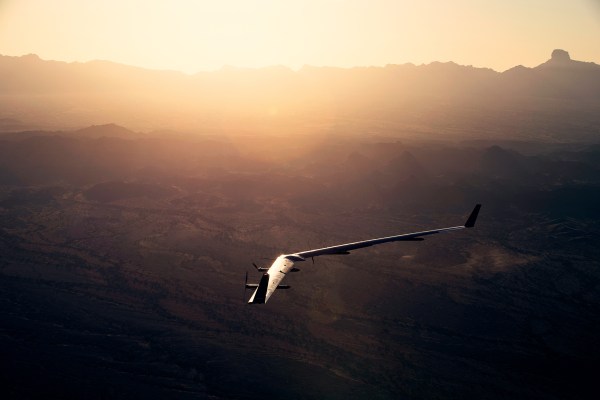
Facebook has announced that it will no longer pursue its dream of building a gigantic, solar-powered plane to blast internet to underserved communities via laser. Surprisingly, it’s just not practical.
In a news post on the company’s coding sub-site, Facebook’s Yael Maguire announced that “we’ve decided not to design or build our own aircraft any longer, and to close our facility in Bridgewater.” Closing the facility comes with the loss of 16 jobs specific to the development and maintenance of the aircraft, the company confirmed to TechCrunch, though plenty relating to other aspects of the project were unaffected.
The company will continue its work with partners, such as Airbus, to help advance “high altitude platform stations” (HAPS) like the Aquila.
The program has been underway since 2014 (the acquisition of Ascenta seems to have been its real start) and public since 2015, and had its first test flight in 2016 — resulting in a “structural failure,” hard landing and subsequent NTSB investigation. The second test flight was better, but far from perfect.
The craft itself, an enormous flying V that stayed aloft at extremely low power draw replenished by solar cells, seems to have worked quite well, actually, despite a few hiccups. But Facebook isn’t the only company looking to get into low-power, high-altitude communications craft.
“As we’ve worked on these efforts, it’s been exciting to see leading companies in the aerospace industry start investing in this technology too — including the design and construction of new high-altitude aircraft,” wrote Maguire.
Considering the considerable scale of investment required to build a craft like this from scratch, and the vast gap in expertise and core competencies between a social network and a veteran aerospace company, it’s not surprising that Facebook decided to cut its losses.
The decision was preceded by a report from Business Insider that the project had more or less stalled: its head and chief engineer left last month after, from reading between the lines, efforts to double down on the project with a redesign and private hangar were rejected.
The Aquila plan, like other ambitious connectivity ideas, some still in the offing, was conceived in a period one might call “peak Facebook,” when it was at the height of its growth, before it attracted nearly the level of criticism it faces today, and when its goals were lofty in several ways.
No doubt the company plans to pursue “the next billion” in a way that isn’t quite so costly or unprecedented. Maguire does indicate that work will continue, just not in such a direct way:
Going forward, we’ll continue to work with partners like Airbus on HAPS connectivity generally, and on the other technologies needed to make this system work, like flight control computers and high-density batteries. On the policy front, we’ll be working on a proposal for 2019 World Radio Conference to get more spectrum for HAPS, and we’ll be actively participating in a number of aviation advisory boards and rule-making committees in the US and internationally.
It’s hard to fault Facebook for its ambition, though even at the time there were plenty who objected to this extremely techno-utopian idea of how internet could be delivered to isolated communities. Surely, they said, and will continue to say, that money would be better spent laying fiber or establishing basic infrastructure. We’ll see.
I asked Facebook for more information, such as what projects specifically it will be backing, and what will happen to the IP and hardware the Aquila program comprised.
Although a Facebook representative declined to answer my specific questions, they emphasized the fact that the Aquila project was both successful and wide-ranging; although an actual aircraft will no longer be part of it (that duty falls to actual aerospace companies), there were many other advances in transmission, propulsion and so on that are still very much in active development. What exactly the company plans to do with those is still unclear, but we can probably expect news on that front over the next few months as the program adjusts focus.
Be the first to comment